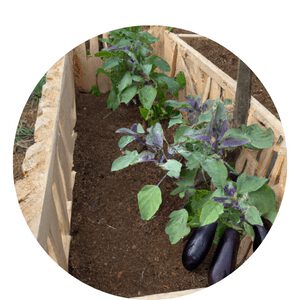How To Grow Eggplant in a Raised Beds
Growing eggplant in raised beds is a great way to enjoy the fruits of your labor without having to worry about pests and weeds.
With proper soil preparation, good drainage, and adequate sunlight, you can successfully grow eggplant in a raised garden bed.
It’s also important to select the right variety for your climate and provide the plants with sufficient nutrients to ensure a healthy harvest.

Eggplant Menu
The benefits of growing eggplant in raised beds
Raised beds are a great way to grow eggplant and offer a variety of benefits.
First off, growing in a raised bed allows for better drainage and improved aeration, which is essential for healthy eggplant growth.
It also offers more control over soil quality and temperature, allowing you to enrich the soil with amendments that best suit your needs.
Additionally, raised beds can help prevent weeds from competing with your eggplants for resources.
This is because most weeds require deeper root systems to survive than what is possible in the shallow soils of raised beds.
Another benefit of using raised beds is that it helps keep pests away from your plants since their height makes it more difficult for insects like aphids or slugs to get close enough to do damage.
Preparing the raised bed
Preparing the raised bed is an essential step in growing eggplant in a raised bed.
To begin, it should first be determined how much space is available for the garden and how many plants will fit.
If necessary, build a new frame for the raised bed using wood or metal that is untreated with chemicals.
The next step is to fill the bed with soil.
For best results, use a well-draining soil mix that includes compost, organic matter and other nutrients needed for healthy plant growth.
The soil should be about 12 inches deep so that it can hold enough water for the plants to thrive.
After filling the bed with soil, lightly compact it down by pressing firmly on it with your hands or feet.
This will help prevent it from becoming too loose and waterlogged while promoting better drainage of excess water.
Once you have the perfect raised bed You know your eggplants can be fed Ensure the soil is loose and rich Give them a lot of sun and a switch Water often but not too much Fertilize them once in a month or such Pruning away the foliage with care A delicious harvest will soon be there!
Chappy The Gardener
Selecting a location
Selecting a location for your raised bed is key to successful eggplant growth.
If possible, choose the sunniest spot in the garden; eggplants need at least six hours of direct sunshine each day.
Additionally, ample space for root expansion will ensure healthy plant development and yield—a minimum of three square feet per plant should do the trick!
Keep in mind that most eggplant varieties are sensitive to extreme temperatures, so avoid windy or overly shaded areas.
Picking a spot with access to well-draining soil is essential for avoiding root rot and other diseases known to plague eggplants.
Finally, consider nearby planting companions: bush beans, peppers, and tomatoes all benefit from being planted alongside one another.
Take your time when selecting a location — proper placement can make all the difference when it comes to eggplant success!
Planting the eggplant
Planting the eggplant is an important step in successfully harvesting this delicious vegetable.
When planting in raised beds, there are some key considerations to ensure a healthy and abundant crop.
First, it’s important to choose the right variety of eggplant for your region or climate.
This will ensure that your plants will grow quickly and thrive throughout the growing season.
You’ll also need to make sure that your soil has adequate drainage, as wet soils can cause diseases like blossom end rot or root rot to occur.
Additionally, provide adequate space between each plant so they have enough room for their roots to spread out and access oxygen and fertilizer more easily.
Once planted, water deeply every few days instead of frequently but lightly watering – this encourages strong root development which makes the plants more resilient against disease and extreme temperatures.
Choosing the right variety
Growing eggplant in a raised bed is an excellent way to bring fresh, nutritious produce to your table.
But with so many different varieties of eggplant available, how do you choose the right one?
To ensure success when growing eggplant in a raised bed, it’s important to select the right variety for your garden conditions.
When selecting an eggplant variety, look for one that is suited to your local climate and soil type.
Consider whether the plant needs full sun or part shade; some varieties thrive in warmer climates while others are best suited for cooler temperatures.
Additionally, consider how much space each plant will take up and if there are any pests or diseases that could affect it in your area.
Finally, think about how long it will take from planting until harvest time and check whether the fruit can handle being stored over winter if necessary.
Planting the seeds or seedlings
Whether you choose to plant the seeds or seedlings, it’s important to understand the best practices for growing eggplant in your garden.
When planting from seeds, it’s best to start them indoors about 8 weeks before the last frost of spring.
This will give them enough time to develop strong roots before you plant outdoors.
After all danger of frost has passed and temperatures are consistently above 75°F (24°C), it’s time to transplant your starts into the prepared raised beds.
Plant each transplant 12-15 inches apart so they have enough room for proper development.
Maintaining the raised bed
Here are some tips for maintaining your raised bed so you can ensure that your eggplant thrive:
First, it’s important to consistently keep weeds at bay by regularly checking for any unwanted plants and removing them before they spread throughout the garden.
Mulch around your eggplants can help significantly reduce weed growth.
Additionally, keep an eye out for pests by inspecting your plants regularly and looking out for signs of distress such as wilting or discoloration on leaves.
Watering
When watering an eggplant plant in a raised bed, it’s important to provide deep and regular waterings.
This allows for even growth as well as encouraging strong root development which helps keep the plant healthy.
If possible, use drip irrigation or soaker hoses that deliver water directly at the base of each plant rather than using overhead sprinklers that just wet the surface of soil with shallow waterings that dry quickly.
Organic Fertilizer
Eggplant is a delicious and nutritious addition to any garden, and growing it in raised beds with organic fertilizers can be an easy and rewarding experience.
Organic fertilizers are derived from natural sources, such as plants, animals, and minerals, and they can help provide your eggplant plants with the nutrients they need to thrive.
There are many types of organic fertilizers to choose from, each with its own unique set of benefits.
Some examples include compost, bone meal, and blood meal.
Compost is a great all-purpose fertilizer that can be made at home by decomposing organic matter, such as kitchen scraps and yard waste.
Bone meal is a slow-release fertilizer made from ground-up animal bones, and it is an excellent source of phosphorous, which helps with root growth and flowering.
Blood meal is a fast-acting fertilizer made from dehydrated animal blood, and it is high in nitrogen, which helps with leafy green growth.
To use organic fertilizers in your eggplant raised beds, simply mix them into the soil before planting or top dress them around the base of the plants.
It is important to follow the instructions on the fertilizer label and not overfertilize, as this can lead to excess foliage and reduced fruit production.
With a little care and attention, you can enjoy a bountiful harvest of eggplants all season long.
Controlling pests and diseases
Growing eggplants in raised beds is a great way to produce a large crop with minimal effort.
But, controlling pests and diseases can be tricky if left unchecked. In order to protect your plants from any potential threats, there are several preventative steps you should take.
Before planting, it’s important to thoroughly inspect the area for any pest infestations or signs of disease.
If you do find something, remove it immediately and discard it away from your garden area.
Additionally, consider planting companion plants such as marigolds and nasturtiums around your eggplants as these are known for repelling certain pests like aphids and nematodes.
Harvesting the eggplant
Growing your own eggplant can be an incredibly rewarding experience.
Not only do you get to enjoy fresh, organic produce, but you also get to understand the process of growing it yourself.
When plants are about four months old and fruits are 7-9 inches long, they’re ready for harvesting.
To pick them correctly, use scissors or shears rather than yanking off the fruit with hands as this may damage the plant or other fruits on it.
Cut near the stem and make sure not to leave any fruit attached as it will rot away quickly if left on its own.
Tips and tricks
Raised beds make growing eggplant easier than ever before. With a few tips and tricks, even novice farmers can be successful in cultivating these delicious veggies!
Here are some essential tips to get the most out of your raised bed eggplant harvest.
Companion planting
Companion planting is the practice of growing certain plants together in close proximity to each other for mutual benefit.
When it comes to growing eggplant in raised beds, there are several plants that make good companions and can help improve the health and productivity of your eggplant plants.
One of the best companions for eggplant is marigold.
Marigolds have a strong scent that can help repel pests such as aphids and whiteflies, which can be harmful to eggplant.
They also produce a chemical called alpha-terthienyl, which has been shown to have nematode-repellent properties.
Nematodes are small worms that can attack the roots of eggplant plants and cause serious damage.
Another good companion for eggplant is basil.
Basil has a strong aroma that can help deter pests, and it is also said to improve the flavor of the eggplant.
Basil and eggplant are often used together in Mediterranean dishes, so they make a great pairing in the garden as well.
Other plants that make good companions for eggplant in raised beds include beans, peppers, and tomatoes.
These plants belong to the same family as eggplant and are thought to help improve the health and productivity of the eggplant plants when grown together.
When companion planting with eggplant in raised beds, it is important to pay attention to the specific needs of each plant and give them enough space to grow.
By choosing the right companions and providing proper care, you can create a thriving and harmonious ecosystem in your raised beds.
Using mulch
Mulch is an essential tool for any gardener, and this is especially true when it comes to growing eggplant in raised beds.
Mulch helps retain moisture in the soil while also keeping weeds at bay.
This makes it easier to grow healthy, abundant eggplant plants without worrying about the competition from other types of vegetation or soil drying out too quickly.
Using mulch is easy – simply spread an even layer around your plants and water regularly. Organic mulches such as straw or bark are preferable because they’re chemical-free, but you can also use synthetic materials like plastic sheeting or landscape fabric if you prefer.
Training the plants to climb
Climbing plants are a great way to add texture, color and movement to your garden.
When you’re growing eggplant in raised beds, training them to climb is the perfect solution for adding visual interest.
By providing support for the plants and shaping their growth with trellises or stakes, you can create an eye-catching display without taking up too much space.
When it comes to training eggplant plants to climb, think of it like creating a vertical garden.
Start by placing sturdy stakes or poles into the soil at the corners of the raised bed.
Place a trellis over each stake and use twine or string to secure it tightly in place.
As your eggplant grows, gently tie branches around the trellis so they will form a lattice pattern as they continue to grow upwards.
In conclusion, growing eggplant in raised beds can be an enjoyable and rewarding experience for any gardener.
By selecting a well-draining soil mix, planting the eggplant in an area with full sun, and providing ample water and fertilizer, you can ensure a successful harvest of flavorful eggplants.
Additionally, using raised beds allows for better control over soil temperature, moisture levels, and weeds.
Finally, don’t forget to rotate your crops every season to prevent pest infestations and diseases.
Click To Grow

Solar Light

Plant Pots

Bird House
Helps Us Grow – Share If You Like
















